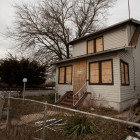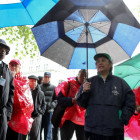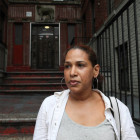Health and Environment
City Pulls Back From AIDS Services Cuts
Eileen Markey |
AIDS activists claimed victory Thursday afternoon after the Bloomberg administration scrapped plans to cut $10 million from the HIV/AIDS ServicesAdministration. The budget ax would have eliminated 248 caseworkers who help poor people living with AIDS get assistance with health, food and housing. The caseworkers’ positions are apparently safe now. On Tuesday, the advocacy group Housing Works sued to stop the cuts. Attorneys for the Bloomberg administration on Thursday morning told U.S. District Court Judge Cheryl Pollak they were withdrawing the cuts, according to Housing Works’ Senior Staff Attorney Armen Merjian.








